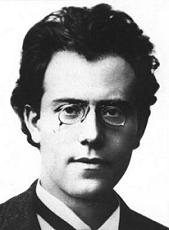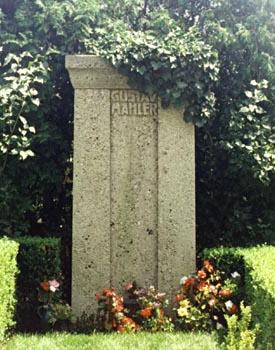 For me, Gustav Mahler is one of the greatest musical geniuses ever. Although he has, besides many songs,
written "only one symphony of eleven movements" (Eliahu Inbal), this enormous work is unique in
musical creation; since Mahler - although younger than e. g. Mozart - died much too young only 51
years old, his creation remained uncompleted, but still the symphonic work Mahler left to posterity
is far more rich and varied than anything composers like Mozart, Beethoven or Wagner wrote - it is a
mirror of world's history, of nature, of life itself, from the very beginning until the apocalyptic
catastrophe, in all its contradictions, its breaks, its beauty, its cruelty, its love, its grieves.
May many other music lovers and critics look at Mahler's symphonies as different, compact unities, for
me they are as well as for Eliahu Inbal one tale with eleven chapters.
It's only natural that every chapter is unlike the other for they describe many different events and
states of nature and human life; still they belong inseparably together, they develop from the
beginning until the end, one part cannot exist without the other.
For me, Gustav Mahler is one of the greatest musical geniuses ever. Although he has, besides many songs,
written "only one symphony of eleven movements" (Eliahu Inbal), this enormous work is unique in
musical creation; since Mahler - although younger than e. g. Mozart - died much too young only 51
years old, his creation remained uncompleted, but still the symphonic work Mahler left to posterity
is far more rich and varied than anything composers like Mozart, Beethoven or Wagner wrote - it is a
mirror of world's history, of nature, of life itself, from the very beginning until the apocalyptic
catastrophe, in all its contradictions, its breaks, its beauty, its cruelty, its love, its grieves.
May many other music lovers and critics look at Mahler's symphonies as different, compact unities, for
me they are as well as for Eliahu Inbal one tale with eleven chapters.
It's only natural that every chapter is unlike the other for they describe many different events and
states of nature and human life; still they belong inseparably together, they develop from the
beginning until the end, one part cannot exist without the other.
Nowadays, nobody will doubt of Mahler's importance as a composer; during his time, he
met hostility and was very contested in this respect even if he had a great reputation as conductor
all over the world. Unyielding regarding fidelity to musical works, today for us a matter of course,
and severe against the vanities of the artists he worked with, the musicians and singers feared but
respected him. Mahler made musical history by proclaiming the idea of the integral art work in the
opera: In his opinion, music, acting, directing, stage set and illumination were inseparable, he
conducted epoch-making performances in Vienna under the influence of Art Nouveau artists like
Gustav Klimt (1862-1918) and working together
with Alfred Roller (1864-1935) which were
celebrated in his time already. Although he was older than most of his composing contemporaries, his
music was far more in advance: He broke the traditional limits of composition and created a completely
new symphonic form which on one hand met much misunderstanding (especially in Vienna where the
audience loved the traditional works) but on the other hand found many enthusiastic worshippers,
especially in the Netherlands and friends of him, composers like
Arnold Schönberg (1874-1951) or conductors like
Bruno Walter (1876-1962) und Willem
Mengelberg (1871-1951).
Despite the efforts of these worshippers of his music, Mahler's compositions are taken
off the programmes of the concert halls after his death; the atrocious shadow of National Socialism
reaches the Jew by birth and his work as much as those who speak up for his music. Only in the Sixties
of the 20th century one begins to understand the magnificence of his compositions and there is not
only a renaissance of his music but the genius Gustav Mahler gets finally the appreciation of
conductors, critics and audience they owed him long since.
On the Web there are many interesting and informative sites about Mahler's life and
work to which you will find links hereafter, still I cannot design a site about the Belle Epoque
without dedicating a chapter to Gustav Mahler in order to honour this musical genius and to express
my love to his music.
Excerpts, ideas and musical-technical help from:
- Berger, Frank: Gustav Mahler - Vision und Mythos. Versuch einer geistigen Biographie,
Verlag Freies Geistesleben, Stuttgart 1993
- Blaukopf, Kurt: Gustav Mahler oder Der Zeitgenosse der Zukunft, Bärenreiter-Verlag,
Kassel 1989
- Hempel, Christoph: Neue Allgemeine Musiklehre, Schott Musik International, Mainz 1997
- Inbal, Eliahu: Gustav Mahler: The Complete Symphonies with The Song of the Earth, Solists,
Choruses and Frankfurt Radio Symphony Orchestra, 1985-1988, Alte Oper, Frankfurt -
DENON/Nippon Columbia 1988
- Kaplan, Gilbert: The Kaplan Mahler Edition, The Kaplan Foundation/Gilbert E. Kaplan, 1996
- Kralik, Heinrich: Gustav Mahler - eine Studie, hrsg. von Friedrich Heller, Verlag Elisabeth Lafite,
Wien, Österreichischer Bundesverlag, Wien
- La Grange, Henry-Louis de/Weiß, Günther (Hrsg.): Ein Glück ohne Ruh'. Die Briefe
Gustav Mahlers an Alma, Wolf Jobst Siedler Verlag, Berlin 1995
- Lebrecht, Norman: Gustav Mahler - Erinnerungen seiner Zeitgenossen, Piper-Schott, Mainz, M &
T Verlag AG, Zürich/St. Gallen 1990
- Mahler, Gustav: Symphonies Nos. 1 and 2 in Full Score, Dover Publications, New York 1987
- Mahler, Gustav: Symphonies Nos. 3 and 4 in Full Score, Dover Publications, New York 1989
- Mahler, Gustav: Symphonies Nos. 5 and 6 in Full Score, Dover Publications, New York 1991
- Mahler, Gustav: Symphony No. 7 in Full Score, Dover Publications, New York 1992
- Mori, Yasuhiko, in: Inbal, Eliahu: Gustav Mahler: The Complete Symphonies with The Song of the
Earth, Solists, Choruses and Frankfurt Radio Symphony Orchestra, 1985-1988, Alte Oper, Frankfurt -
DENON/Nippon Columbia 1988
|


 For me, Gustav Mahler is one of the greatest musical geniuses ever. Although he has, besides many songs,
written "only one symphony of eleven movements" (Eliahu Inbal), this enormous work is unique in
musical creation; since Mahler - although younger than e. g. Mozart - died much too young only 51
years old, his creation remained uncompleted, but still the symphonic work Mahler left to posterity
is far more rich and varied than anything composers like Mozart, Beethoven or Wagner wrote - it is a
mirror of world's history, of nature, of life itself, from the very beginning until the apocalyptic
catastrophe, in all its contradictions, its breaks, its beauty, its cruelty, its love, its grieves.
May many other music lovers and critics look at Mahler's symphonies as different, compact unities, for
me they are as well as for
For me, Gustav Mahler is one of the greatest musical geniuses ever. Although he has, besides many songs,
written "only one symphony of eleven movements" (Eliahu Inbal), this enormous work is unique in
musical creation; since Mahler - although younger than e. g. Mozart - died much too young only 51
years old, his creation remained uncompleted, but still the symphonic work Mahler left to posterity
is far more rich and varied than anything composers like Mozart, Beethoven or Wagner wrote - it is a
mirror of world's history, of nature, of life itself, from the very beginning until the apocalyptic
catastrophe, in all its contradictions, its breaks, its beauty, its cruelty, its love, its grieves.
May many other music lovers and critics look at Mahler's symphonies as different, compact unities, for
me they are as well as for 